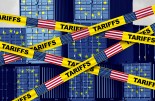Bob Homan: Raging rates and restless investors

This column was originally written in Dutch. This is an English translation.
By Bob Homan, Head of ING Investment Office
It is logical that Trump's tariffs fuel fears of recession. However, hindsight shows that markets that have plummeted for no reason are actually a particularly good time to get in.
Most investors realize that investing, and certainly investing in shares, is a long-term proposition. And if things go well, as they have over the past two years, they wish they had invested more. They therefore see a decline as an opportunity to buy shares at a good price.
Now the decline is here! The threat of American import tariffs did not fail to have an impact on the financial markets. It caused consumer and producer confidence to plummet, which caused unrest, particularly on the American stock exchanges. When the intended tariffs were revealed last week and they turned out to be higher than all expectations, stock markets worldwide fell sharply.
It is a logical reaction: import tariffs will negatively influence global economic growth and bring many regions into or close to a recession. This is obviously not good for corporate profit development. In addition to the effect of lower growth, a large proportion of listed companies will also be directly affected by cost increases in their international supply chains. Furthermore, products will become more expensive, which will increase inflation and make it more difficult to use interest rates as a weapon to fight a recession. In short, an unpleasant economic cocktail that seems to offer few prospects.
These weak prospects are the basis for the sharp decline we are seeing. After all, if there had been clear prospects, the prices would not have fallen so sharply. The lack of perspective makes it difficult to stick to your long-term plan, whether that plan is to buy or to sell. But take comfort in the fact that in retrospect, such moments often turn out to be particularly good entry points. Consider the corona crisis, for example. Although economic growth forecasts and the markets collapsed, share prices recovered at an unprecedented rate. Earlier, during the financial crisis, there seemed to be no way out of the recession. Yet share prices recovered sharply during the course of 2009. I think we should not underestimate the resilience of economies, possibly aided by central banks or government support.
In a year's time, we will know how things went. As I said, it is hard to imagine now that things will get better quickly. But recovery could follow if the Trump administration comes to its senses and starts making deals. Perhaps companies will adapt more quickly than expected and shift their sales markets as quickly as possible. After all, people will ultimately need the same things as before. As a result, there will be more and more local production. From a sustainability perspective, that is certainly not a bad prospect.









